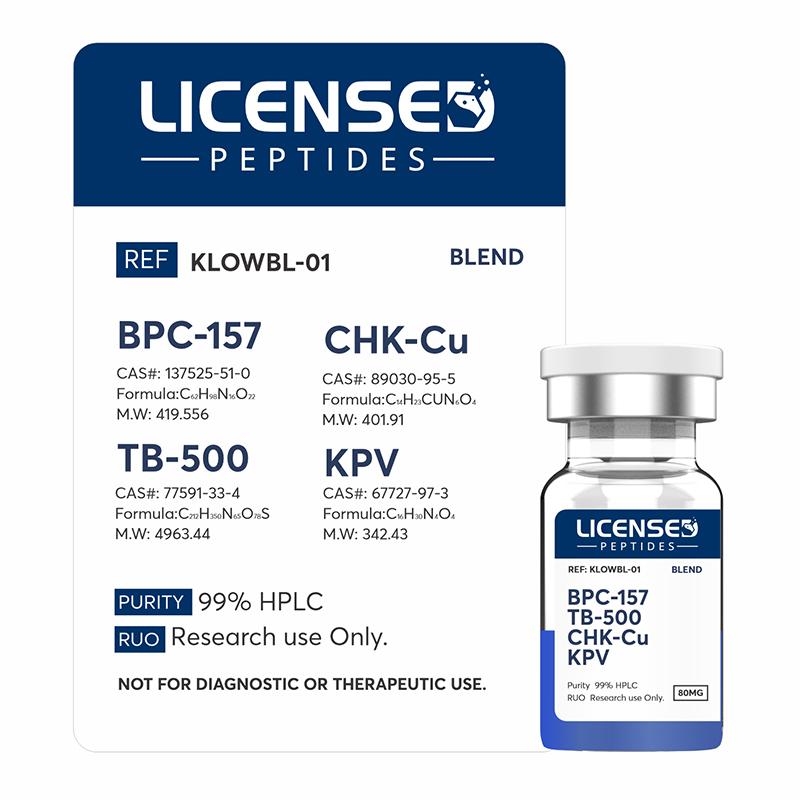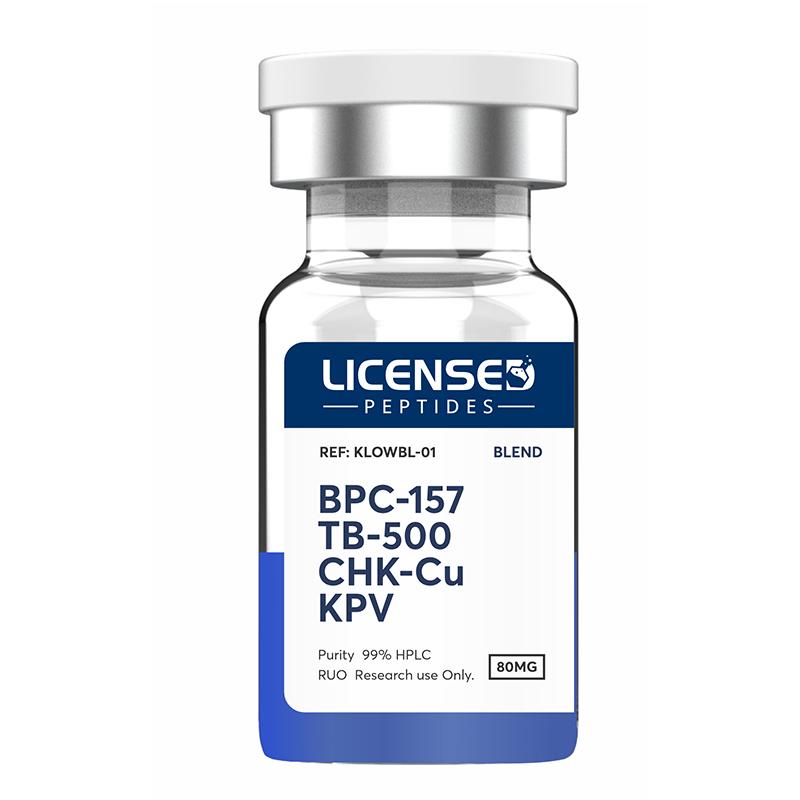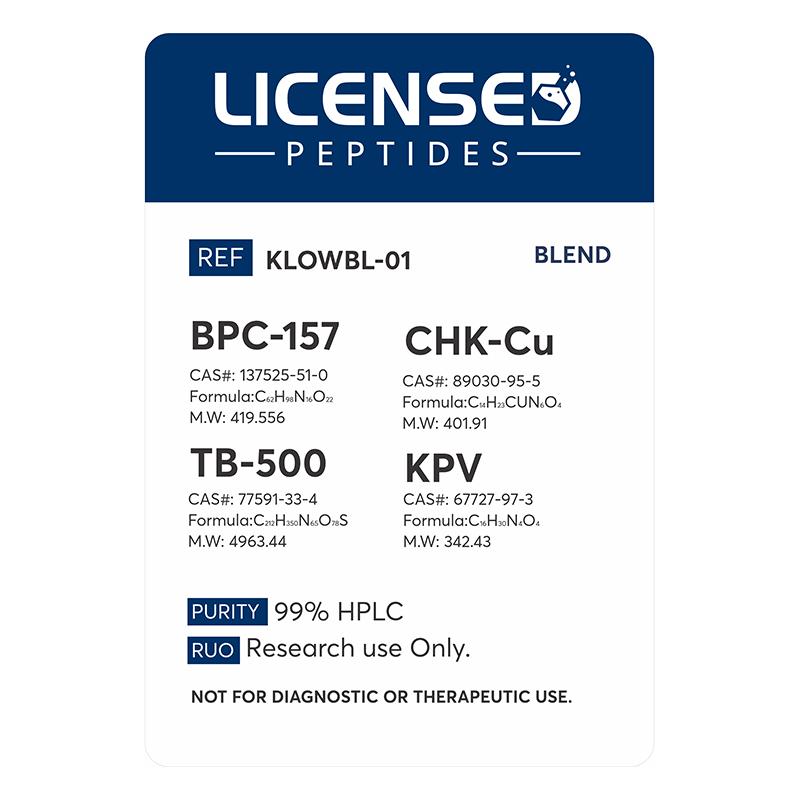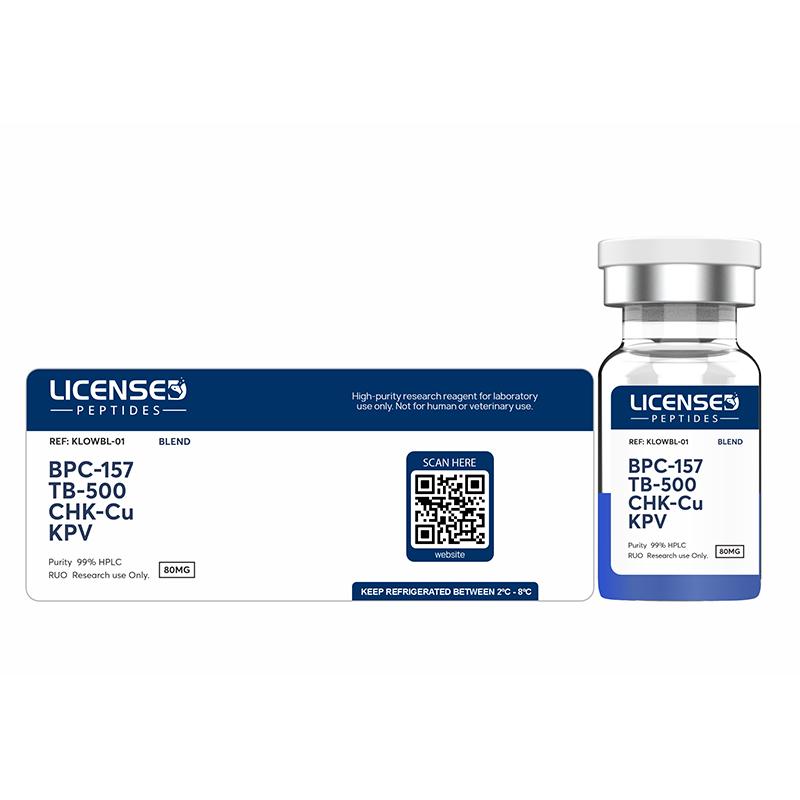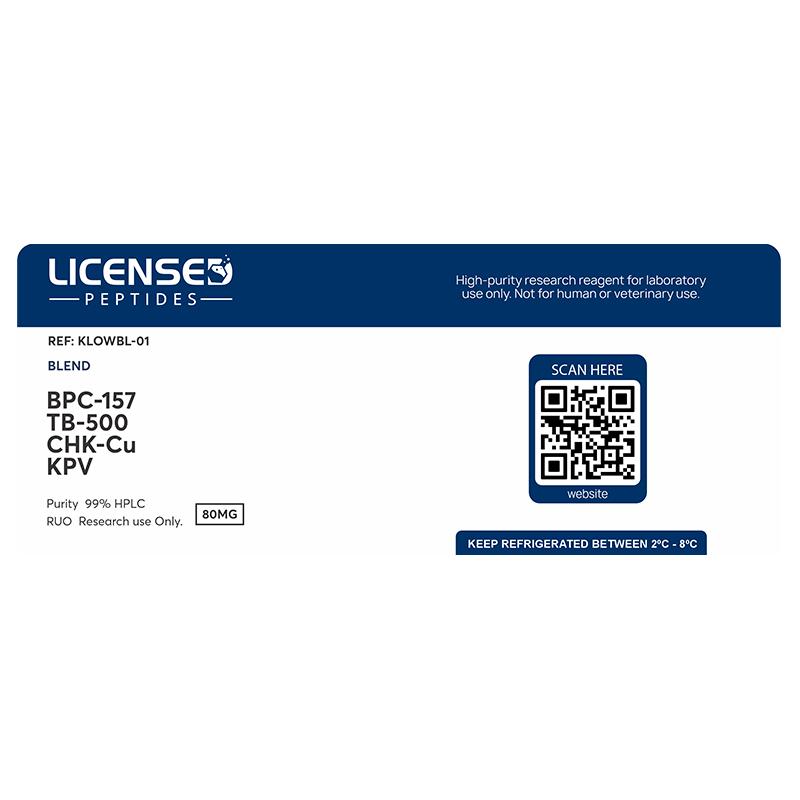BPC157, TB500, GHKCu, KPV (Klow Blend) 80mg
$299.99
The KLOW peptide complex builds upon the foundational GLOW formulation by integrating KPV into the existing triad of BPC-157, TB500 (Thymosin Beta-4), and GHK-Cu, creating a four-component system being evaluated for its synergistic effects on regenerative biology.
$299.99
$299.99
Peptide Capsules
Purchase Peptides
Purchase Blends
The KLOW peptide complex builds upon the foundational GLOW formulation by integrating KPV into the existing triad of BPC-157, TB500 (Thymosin Beta-4), and GHK-Cu, creating a four-component system being evaluated for its synergistic effects on regenerative biology. KPV (Lys-Pro-Val), a tripeptide derived from the C-terminal sequence of α-melanocyte-stimulating hormone (α-MSH), is recognized for its ability to attenuate inflammatory signaling by downregulating pro-inflammatory cytokines such as TNF-α, IL-1β, and IL-6, while simultaneously modulating NF-κB activity. In parallel, BPC-157, a pentadecapeptide fragment of gastric juice, has been studied for its angiogenic, fibroblastic, and extracellular matrix stabilizing properties, thereby facilitating vascularization and tissue repair. TB500, the synthetic analog of the N-terminal region of Thymosin Beta-4, contributes to actin cytoskeleton modulation, cell migration, and wound closure through its effects on β-actin polymerization and cellular motility. GHK-Cu, a naturally occurring copper-binding tripeptide, is implicated in gene expression regulation through epigenetic modulation, suppression of oxidative stress, and upregulation of regenerative gene clusters.
By converging these mechanistic pathways including angiogenesis, cellular migration, cytokine suppression, oxidative balance, and gene regulation, the KLOW complex represents a multi-axis therapeutic strategy under investigation for its potential to enhance tissue regeneration, modulate inflammatory cascades, and restore homeostatic equilibrium in preclinical biological models.
Research
KPV
KPV acts at the genetic level by blocking NF-κB, a central driver of inflammation. Studies indicate:
- Effective at nanomolar concentrations.
- Strong benefits in animal models of colitis
- Reduction of inflammatory signaling in airway epithelial cells
BPC-157
Clinical Safety: Phase I clinical testing confirms BPC-157 is safe in healthy volunteers.
- Growth Hormone Support: Preclinical studies suggest it increases growth hormone receptor expression in tendon fibroblasts.
- Angiogenesis and Healing: It promotes new blood vessel formation through VEGFR2 pathways and regulates nitric oxide for anti-inflammatory benefits.
GHK-Cu
GHK-Cu stands out for its remarkable ability to influence expression of 31.2% of human genes, making it one of the most broadly acting peptides available. Research spanning four decades has documented its effects on:
- Tissue Regeneration: Accelerates wound healing and collagen production
- Cognitive Support: Increases nerve growth factors and myelinated fiber regeneration
- Anti-Cancer Properties: One of only two substances found effective in modulating genes overexpressed in tumor spreading”
TB-500
TB-500 is derived from the actin-binding sequence “LKKTETQ” and is described as:
- Enhancing cell migration and proliferation
- Increasing angiogenesis through VEGF signaling
- Providing antimicrobial effects against bacteria and fungi
- Supporting heart tissue repair
Referenced Citations
The potential of GHK as an anti-aging peptide
Yan Doua, Amanda Leea, Lida Zhua, John Mortona, Warren Ladigesa,*
ALL ARTICLES AND PRODUCT INFORMATION PROVIDED ON THIS WEBSITE ARE FOR INFORMATIONAL AND EDUCATIONAL PURPOSES ONLY.
The products available on this website are intended solely for in-vitro research purposes (Latin: “in glass”), meaning they are used in experiments conducted outside a living organism. These products are not medicines or drugs, have not been evaluated or approved by the U.S. Food and Drug Administration (FDA), and are not intended to diagnose, treat, cure, or prevent any disease or medical condition. Any administration to humans or animals, whether by ingestion, injection, or other means, is strictly prohibited by law.
Test
Storage Instructions:
All of our products are manufactured using the Lyophilization (Freeze Drying) process, which ensures that our products remain 100% stable for shipping for up to 3-4 months.
Once the peptides are reconstituted (mixed with bacteriostatic water), they must be stored in the fridge to maintain stability. After reconstitution, the peptides will remain stable for up to 30 days.
Lyophilization is a unique dehydration process, also known as cryodesiccation, where the peptides are frozen and then subjected to low pressure. This causes the water in the peptide vial to sublimate directly from solid to gas, leaving behind a stable, crystalline white structure known as lyophilized peptide. The puffy white powder can be stored at room temperature until you’re ready to reconstitute it with bacteriostatic water.
Once peptides have been received, it is imperative that they are kept cold and away from light. If the peptides will be used immediately, or in the next several days, weeks or months, short-term refrigeration under 4C (39F) is generally acceptable. Lyophilized peptides are usually stable at room temperatures for several weeks or more, so if they will be utilized within weeks or months such storage is typically adequate.
However, for longer term storage (several months to years) it is more preferable to store peptides in a freezer at -80C (-112F). When storing peptides for months or even years, freezing is optimal in order to preserve the peptide’s stability.
For further information on proper storage techniques, click the link below:
